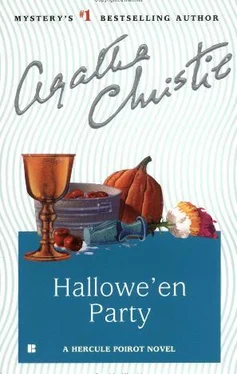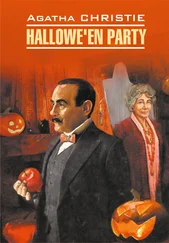Agatha Christie - Hallowe'en Party
Здесь есть возможность читать онлайн «Agatha Christie - Hallowe'en Party» весь текст электронной книги совершенно бесплатно (целиком полную версию без сокращений). В некоторых случаях можно слушать аудио, скачать через торрент в формате fb2 и присутствует краткое содержание. Год выпуска: 2004, ISBN: 2004, Издательство: Berkley, Жанр: Классический детектив, на английском языке. Описание произведения, (предисловие) а так же отзывы посетителей доступны на портале библиотеки ЛибКат.
- Название:Hallowe'en Party
- Автор:
- Издательство:Berkley
- Жанр:
- Год:2004
- ISBN:ISBN-13: 978-0425129630
- Рейтинг книги:3 / 5. Голосов: 1
-
Избранное:Добавить в избранное
- Отзывы:
-
Ваша оценка:
- 60
- 1
- 2
- 3
- 4
- 5
Hallowe'en Party: краткое содержание, описание и аннотация
Предлагаем к чтению аннотацию, описание, краткое содержание или предисловие (зависит от того, что написал сам автор книги «Hallowe'en Party»). Если вы не нашли необходимую информацию о книге — напишите в комментариях, мы постараемся отыскать её.
Hallowe'en Party — читать онлайн бесплатно полную книгу (весь текст) целиком
Ниже представлен текст книги, разбитый по страницам. Система сохранения места последней прочитанной страницы, позволяет с удобством читать онлайн бесплатно книгу «Hallowe'en Party», без необходимости каждый раз заново искать на чём Вы остановились. Поставьте закладку, и сможете в любой момент перейти на страницу, на которой закончили чтение.
Интервал:
Закладка:
So far they were really only names to Mrs. Oliver. There was a Nan and a Beatrice and a Cathie, a Diana and a Joyce, who was boastful and asked questions.
I don't like Joyce much, thought Mrs. Oliver. A girl called Ann, who looked tall and superior. There were two adolescent boys who appeared to have just got used to trying out different hair styles, with rather unfortunate results. A smallish boy entered in some condition of shynesss.
"Mummy sent these mirrors to see if they'd do," he said; in a slightly breathless voice, Mrs. Drake took them from him. "^hank you so irouch. Eddy," she said.
"They're just ordinary looking hand mirrors," said the girl called Ann.
"Shall we really see our future husbands' faces in them?"
"Some of you may and some may not," said Judith Butler.
"Did you ever seen your husband's face when you went to a party-I mean this kind of a party?"
"Of course she didn't," said Joyce.
"She might have," said the superior Beatdce.
"ESP. they call it. Extra sensory perception," she added in the tone of one pleased with being thoroughly conversant with the terms of the times. "read one of your books," said Ann to Mrs. Oliver.
"The Dying Goldfish. It was quite good," she said kindly.
"I didn't like that one," said Joyce. "There wasn't enouigh blood in it. I like murders to have lotfs of blood."
"It's A bit messy," said Mrs. Oliver, "don't you think?"
"But exciting," said Joyce.
"Not necessarily," said Mrs. Oliver.
"I saw a murder once," said Joyce.
"Don't be silly, Joyce," said Miss Whittaker, the schoolteacher.
"I did," said Joyce.
"Did you really," asked Cathie, gazing at Joyce with wide eyes, "really and truly see a murder?"
"Of course she didn't," said Mrs. Drake.
"Don't say silly things, Joyce."
"I did see a murder," said Joyce. "I did. I did. I did."
A seventeen-year-old boy poised on a ladder looked down interestedly.
"What kind of a murder?" he asked.
"I don't believe it," said Beatrice.
"Of course not," said Cathie's mother. "She's just making it up."
"I'm not. I saw it."
"Why didn't you go to the police about it?" asked Cathie.
"Because I didn't know it was a murder when I saw it. It wasn't really till a long time afterwards, I mean, that I began to know that it was a murder. Something that somebody said only about a month or two ago suddenly made me think: Of course, that was a murder I saw."
"You see," said Arm, "she's making it all up. It's nonsense."
"When did it happen?" asked Beatrice.
"Years ago," said Joyce. "I was quite young at the time," she added.
"Who murdered who?" said Beatrice.
"I shan't tell any of you," said Joyce. "You're all so horrid about it."
Miss Lee came in with another kind of bucket. Conversation shifted to a comparison of buckets or plastic pails as most suitable for the sport of bobbing for apples. The majority of the helpers returned to the library for an appraisal on the spot. Some of the younger members, it may be said, were anxious to demongstrate, by a rehearsal of the difficulties and their own accomplishment in the sport. Hair got wet, water got spilt, towels were sent for to mop it up. In the end it was decided that a galvanised bucket was preferable to the more meretricious charms of a plastic pail which overturned rather too eeasily.
Mrs. Oliver, setting down a bowl of apples which she had carried in to replenish the store required for tomorrow, once more helped herself to one.
"I read in the paper that you were fond of eating apples," the accusing voice of Ann or Susan-she was not quite sure which-spoke to her."
"It's my besetting sin," said Mrs. Oliver.
"It would be more fun if it was melons," objected one of the boys. "They're so juicy. Think of the mess it would make," he said, surveying the carpet with pleasurable anticipation.
Mrs. Oliver, feeling a little guilty at the public arraignment of greediness, left the room in search of a particular apartment, the geography of which is usually fairly easily identified. She went up the staircase and, turning the corner on the half landing, cannoned into a pair, a girl and a boy, clasped in each other's arms and leaning against the door which Mrs. Oliver felt fairly certain was the door to the room to which she herself was anxious to gain access. The couple paid no attention to her. They sighed and they snuggled. Mrs. Oliver wondered how old they were. The boy was fifteen, perhaps, the girl little more than twelve, although the development of her chest seemed certainly on the mature side.
Apple Trees was a house of fair size. It had, she thought, several agreeable nooks and corners. How selfish people are, thought Mrs. Oliver. No consideration for others. That well-known tag from the past came into her mind. It had been said to her in succession by a nursemaid, a nanny, a governess, her grandmother, two great aunts her mother and a few others.
"Excuse me," said Mrs. Oliver in a loud, clear voice.
The boy and the girl clung closer than ever, their lips fastened on each other's.
"Excuse me," said Mrs. Oliver again, "do you mind letting me pass? I want to get in at this door."
Unwillingly the couple fell apart. They looked at her in an aggrieved fashion. Mrs. Oliver went in, banged the door and shot the bolt.
It was not a very close fitting door. The faint sound of words came to her from outside.
"Isn't that like people?" one voice said in a somewhat uncertain tenor.
"They might see we didn't want to be disturbed."
"People are so selfish," piped a girl's voice.
"They never think of anyone but themselves."
"No consideration for others," said the boy's voice.
PREPARATIONS for a children's party usually give far more trouble to the organisers than an entertainment devised for those of adult years.
Food of good quality and suitable alcoholic refreshment-with lemonade on the side, that, to the right people, is quite enough to make a party go. It may cost more but the trouble is infinitely less. So Ariadne Oliver and her friend Judith Butler agreed together.
"What about teenage parties?" said Judith.
"I don't know much about them," said Mrs. Oliver.
"In one way," said Judith, "I think they're probably least trouble of all. I mean, they just throw all of us adults out.
And say they'll do it all themselves."
"And do they?"
"Well, not in our sense of the word," said Judith. "They forget to order some of the things, and order a lot of other things that nobody likes. Having turfed us out, then they say there were things we ought to have provided for them to find. They break a lot of glasses, and other things, and there's always somebody undesirable or who brings an undesirable friend. You know the sort of thing. Peculiar drugs and what do they call it? Flower Pot or Purple Hemp or LSD, which I always have thought just meant money, but apparently it doesn't."
"I suppose it costs it," suggested Ariadne Oliver.
"It's very unpleasant, and Hemp has a nasty smell."
"It all sounds very depressing," said Mrs. Oliver.
"Anyway, this party will go all right.
Trust Rowena Drake for that. She's a wonderful organiser. You'll see."
"I don't feel I even want to go to a party," sighed Mrs. Oliver.
"You go up and lie down for an hour or so. You'll see. You'll enjoy it when you get there. I wish Miranda hadn't got a temperature she's so disappointed at not being able to go, poor child."
The party came into being at half past seven. Ariadne Oliver had to admit that her friend was right. Arrivals were punctual.
Everything went splendidly. It was well imagined, well run and ran like clockwork.
There were red and blue lights on the stairs and yellow pumpkins in profusion.
The girls and boys arrived holding decorated broomsticks for a competition.
Читать дальшеИнтервал:
Закладка:
Похожие книги на «Hallowe'en Party»
Представляем Вашему вниманию похожие книги на «Hallowe'en Party» списком для выбора. Мы отобрали схожую по названию и смыслу литературу в надежде предоставить читателям больше вариантов отыскать новые, интересные, ещё непрочитанные произведения.
Обсуждение, отзывы о книге «Hallowe'en Party» и просто собственные мнения читателей. Оставьте ваши комментарии, напишите, что Вы думаете о произведении, его смысле или главных героях. Укажите что конкретно понравилось, а что нет, и почему Вы так считаете.












